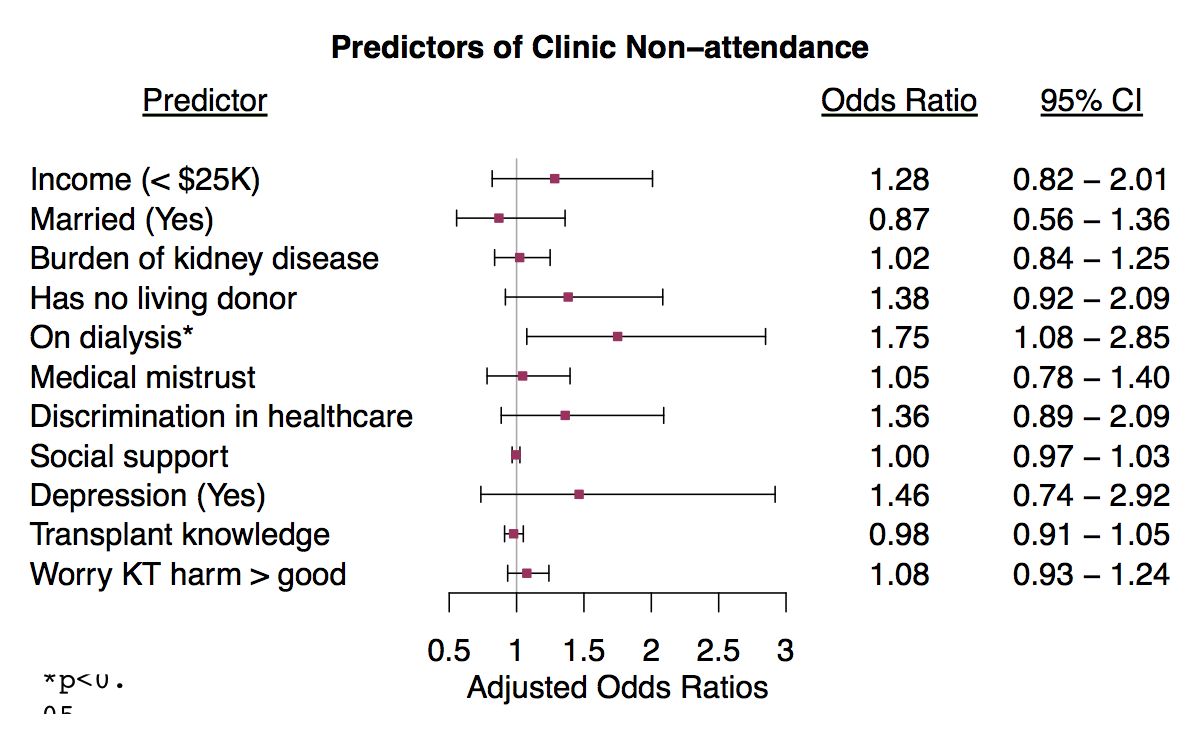Predictors of Kidney Transplant Evaluation Attendance
C. G. Ford1, Y. Leyva1, Y. Zhu2, E. J. Croswell3, C. Puttarajappa4, M. A. Dew3, M. L. Unruh2, Y. Ng2, L. Myaskovsky1
1Center for Healthcare Equity in Kidney Disease, University of New Mexico Health Sciences Center, Albuquerque, NM, 2University of New Mexico School of Medicine, Albuquerque, NM, 3University of Pittsburgh, Pittsburgh, PA, 4University of Pittsburgh School of Medicine, Pittsburgh, PA
Meeting: 2020 American Transplant Congress
Abstract number: B-101
Keywords: Kidney transplantation, Psychosocial, Risk factors, Screening
Session Information
Session Name: Poster Session B: Kidney Psychosocial
Session Type: Poster Session
Date: Saturday, May 30, 2020
Session Time: 3:15pm-4:00pm
 Presentation Time: 3:30pm-4:00pm
Presentation Time: 3:30pm-4:00pm
Location: Virtual
*Purpose: Given that clinic non-attendance is associated with worse health outcomes for patients and increased burden for providers, we examined whether patient worry about harm associated with transplant and social determinants of health predict kidney transplant evaluation (KTE) clinic non-attendance.
*Methods: All patients completed an interview before their first scheduled KTE, covering kidney transplant (KT) worry (i.e., “worry that transplant will do more harm than good”), demographics (e.g., income, education), medical factors (e.g., dialysis (yes/no), co-morbidities), knowledge factors (e.g. knowledge about transplant), cultural factors (e.g. medical mistrust), and psychosocial characteristics (e.g., social support, depression). We used multiple logistic regression analysis to determine the relationship between KT worry and KTE clinic non-attendance (i.e. patient never completed KTE), controlling for social determinants of health. We examined variables for multicollinearity before proceeding.
*Results: Our sample (N=1119) was 37% female, median age 59.4 years (IQR= 49.2-67.5), 45% had income <$25,000, 47% were < high school graduate, 48% were married, and 44% had public insurance only. Of note, 142 (13%) never attended a KTE clinic appointment. Adjusted multivariable modeling showed that KT worry was not predictive of clinic non-attendance. Being on dialysis predicted higher odds of KTE non-attendance than those who were never on dialysis (OR=1.75; p=.02; 64% of KTE attendees on dialysis vs. 77% of non-attendees on dialysis). No other variables approached statistical significance in the final adjusted model (see Figure 1).
*Conclusions: Patient worry about transplant related harm did not predict clinic attendance in our sample. Although concerns about adverse side-effects predicts patient behavior in other areas of healthcare, KTE may differ in ways that resist the predictive utility of these concerns. Independent of other medical factors, patients on dialysis prior to their evaluation appointment were less likely to ever attend KTE. Transplant teams should consider targeting patients on dialysis for additional support (e.g., resources to attend appointment, additional reminders once appointments are scheduled). Future research should focus on the benefits of preemptively referring patients for transplant evaluation.
To cite this abstract in AMA style:
Ford CG, Leyva Y, Zhu Y, Croswell EJ, Puttarajappa C, Dew MA, Unruh ML, Ng Y, Myaskovsky L. Predictors of Kidney Transplant Evaluation Attendance [abstract]. Am J Transplant. 2020; 20 (suppl 3). https://atcmeetingabstracts.com/abstract/predictors-of-kidney-transplant-evaluation-attendance/. Accessed January 30, 2026.« Back to 2020 American Transplant Congress

